First Nations Feminism
Report by Kai Ruo Soh, PhD Candidate and FRN HDR Steering Group member
The symposium started off with two very insightful talks by Marlene Longbottom from UOW and Evelyn Aralueun Corr from USYD. Marlene spoke about feminism in aboriginal culture through sharing her experiences as an indigenous feminist within her own community. Next, Evelyn discussed how although we are currently at the historical peak of feminist visibility, aboriginal women are being largely ignored when they speak out or take action against the impacts of colonialism in their communities. With her research, she aims to provide discussion in the academy and the broader national discourse on the efforts by aboriginal women.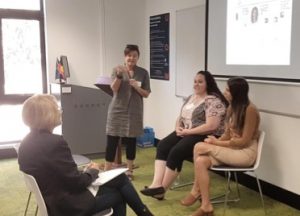
Photo by: Kai Ruo Soh
Talk and Photo Exhibition
Report by Kai Ruo Soh, PhD Candidate and FRN HDR Steering Group member
Julia Martinez and Kate Bagnall presented an intriguing photo exhibition drawn from their forthcoming edited collection on Chinese women, gendered migration and their mobile lives between China and Australia. The exhibition included images of the Chinese Australian women, which was accompanied by their short biographical sketches.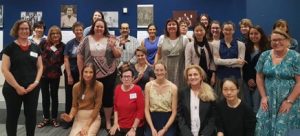
Photo by: Kai Ruo Soh
HDRs Doing Feminist-Inspired Research
Report by Dylan Davis, PhD Candidate and FRN HDR Steering Group member/
As part of the Symposium, the FRN’s Higher Degree Research (HDR) Steering Group coordinated a panel session on ‘HDRs Doing Feminist-Inspired Research’. The event was designed to facilitate conversation among researchers at different stages of their research trajectories by allowing HDRs to do short presentations on how feminism has influenced their research and receive feedback and comments from invited respondents. Six HDRs – Samson Soulsby, Emma Bellino, Susannah Clement, Rachael Bolton, Nadia Al Esi and Dipali Mathur – presented from across a wide range of disciplines and topics including monster theory, nationality laws and interracial marriage, feminist geography, Australian masculinities, Arab women writers, and post-humanism. Each of the presenters then received feedback and suggestions from our invited respondents, Tanja Dreher (Associate Professor in Media at UNSW) and Linda Steele (Senior Lecturer in Law at UTS). Many thanks for our presenters who were able to raise some thought-provoking issues for feminist research in a very short space of time and to our respondents for their insights and generosity. Thanks also to Fabienne Else for facilitating the session.
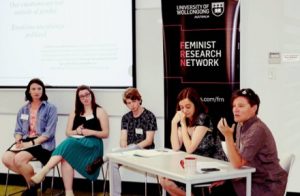 Photo by: Ayesha Hasan, PhD Candidate
Photo by: Ayesha Hasan, PhD Candidate
Public Event with Ellen van Neerven and Clementine Ford
Report by Samson Soulsby, PhD Candidate, LHA Postgraduate Representative
Following on from UOW’s “Feminist Interventions, Feminist Impacts” symposium, Ellen van Neerven and Clementine Ford, along with their host for the evening, Hayley Scrivener, spoke powerfully about their experiences as women/creators, sharing insights into their creative processes, their achievements and struggles, and their stories—particularly Heat and Light (Van Neerven, 2014) and Fight Like A Girl (Ford, 2016). Drawing on these personal experiences, Van Neerven and Ford discussed feminisms: the existence of, and the need for, a plurality of feminist perspectives, a kind of solidarity built on acknowledging the differences in women’s lives and the disparity in privileges awarded to them, and respecting the differing needs, goals, perspectives, knowledges, and conceptualisations of feminism that come from these different experiences.
A running theme throughout the evening—throughout the conversations of Indigenous Australian activism, the challenges of working through anxiety as a creator, the marriage equality debate, and the importance of support networks—was the voice, a continuous reflection on how we can all embed a feminist ethos into our interactions, especially on online platforms and in public conversations. In this era of ubiquitous social media, feminists—and especially feminists of privilege—are called first to listen and carefully consider when to share one’s own voice, and when it is more important to raise up the voices of others.
I thank Ellen, Clementine, and Hayley for sharing with us such a thought-provoking and enjoyable event, and extend my thanks to the Wollongong Writers Festival and UOW’s FRN for making it possible.
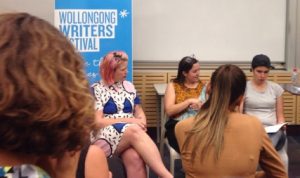
Photo by: Susannah Clement, PhD Candidate
Violence against Women and Violent Women
Report by Kai Ruo Soh, PhD Candidate, FRN HDR Steering Group Member
This panel session focuses on the discussion on violence against women through three different contexts: through law, the workplace and media representation. Julia Quilter’s paper examines a sexual assault trial to demonstrate the reasons behind why women do not report sexual assaults, and how the justice system could work against female victims. Di Kelly’s presentation illustrated the factors behind why organisations largely ignore cases on work place bullying. Di’s paper concluded with possible remediation and prevention of such issues dire to women employees, and also encouraged feminist scholars to turn their research to this topic. Last but not least, Renee Middlemost and Charlotte Allen explore how television shows such as Orange is the New Black and Wentworth are depicting the idea of feminism. Renee and Charlotte argue that there are issues behind these depictions as the shows represent the violent woman to be “strong” and a “feminist”.
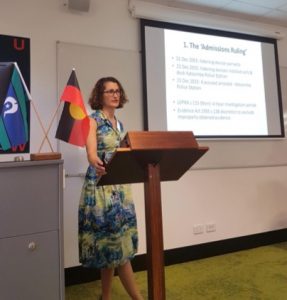 Photo by: Kai Ruo Soh, PhD Candidate
Photo by: Kai Ruo Soh, PhD Candidate
Contesting Gendered Emotions – Sponsored by Contemporary Emotions Research Network (CERN)
Report by Sukhmani Khorana, Senior Lecturer, Online Coordinator FRN
On the second day of the FRN symposium, proceedings commenced with a panel on ‘Contesting Gendered Emotions’, co-sponsored by the Contemporary Emotions Research Network (CERN). This includes two invited speakers who were external to UOW – Dr Melissa Bellanta (ACU), and Dr Rebecca Olson (UQ), as well as CERN co-founder, Dr Roger Patulny. While Bellanta’s paper politicised masculine sentimentality in accounts of ‘larrikins’ in Australian colonial history, Olson looked at contemporary online media which facilitates male expression of emotion, albeit using context-specific vocabulary and gendered rules. Patulny’s presentation highlighted quantitative evidence that challenges normative ideas of gender-specific emotions in surveyed populations. This was followed by a screening of short films on the theme of intersectionality.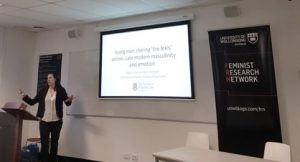
Photo by: Kai Ruo Soh, PhD Candidate
Intersectionality on Film
Report by Sukhmani Khorana, Senior Lecturer, Online Coordinator FRN
Two of the films were obtained with permission from the Singapore International Film Festival, and put a spotlight on the plight of Rohingya refugee children in the Asia-Pacific, and the coming of age of Thai school girls, respectively. The third film explored the issue of disability, especially as it intersects with women’s everyday lives. Karen Crowe, an HDR student at UOW, responded to the screening, and led a discussion with members of the audience on various aspects of intersectionality in practice. 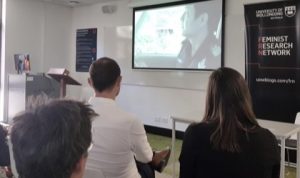
Photo by: Kai Ruo Soh, PhD Candidate
Milk Culture: Feminist Resonances across Lives in the Dairy Industry
This panel presentation was themed based on the dairy industry in Australia and was presented by Deirdre Wicks from University of Newcastle, along with Melissa Boyd and Alison Moore. Deirdre began the panel by introducing the dairy industry through a historical and theoretical engagement of the ‘animal question’ Deirdre explores this by using a feminist lens to examine the benefits and perceived dangers for women associating their interest with animals. Next, Melissa discussed the importance of animal ethics in the dairy industry through three short stories, based on Melissa’s personal experiences. Last but not least, Alison presented a text-analytic study of the dairy culture and its promotion in Australia. Alison’s paper also examines the gender representation of these promotional collaterals and argues that women are targeted as both gatekeepers to family consumption and as consumers with special nutritional needs in different reproductive lifestyle.
Roundtable: Feminist Interventions/Impacts: A Multidisciplinary Approach
The roundtable featured LHA’s feminist researcher, Esther Alloun, Vera Mcakie, Fiona Probyn-Rapsey, Lisa Slater and Ika Willis. The roundtable consisted of a discussion on how feminism has impacted their research area, along with the growth and support FRN has provided to various HDRs and Academics over the years.
